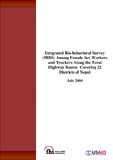Please use this identifier to cite or link to this item:
https://hdl.handle.net/20.500.14356/691| Title: | Integrated Bio-behavioral Survey (IBBS) Among Female Sex Workers and Truckers along the Terai Highway Routes Covering 22 Districts of Nepal |
| Authors: | Family Health International/Nepal NEW ERA |
| Issue Date: | 2004 |
| Publisher: | Family Health International/Nepal |
| Keywords: | Kathmandu Female Sex Workers Terai Highway Routes |
| Abstract: | EXECUTIVE S UMMARY: Background of the Study An HIV/STI and behavioral risk survey of female sex workers and truckers conducted in 1999 in the Central and Eastern Terai of Nepal near the Indian border provided baseline biological and behavioral risk prevalence for a set of HIV/STI prevention interventions, which followed. FHI and six NGO partners implement behavior change interventions with FSWs and their clients including: peer communication; outreach work; condom demonstrations & free distribution; community awareness raising through events and street dramas; IEC materials distribution; condom social marketing; drop-in centers; training; and mass media for condom promotion for sexual health. In addition, mobile STI diagnosis and treatment services are provided through BCI peer communicator referrals and at locations within BCI projects. These integrated activities promote risk reduction and have been implemented synergistically since 2001. The survey conducted in 1999 found that HIV prevalence was relatively low in both groups (3.9% among FSW and 1.5% among truckers) butthat other STIs, notably syphilis, were quite high (18.8% among FSW). Other highlights of the survey were that HIV and STI infection among FSW was highly related to previous sex work in Maharashtra, India, particularly Mumbai. The condom use in the last sex act reported by FSWs was about 42% and use of condom by truckers in the last sex with FSWs was about 69.3%. Since that 1999 survey, interventions among both groups have been intensified. Furthermore, yearly behavioral surveillance surveys (BSS)have shown that condom use has steadily increased and that commercial sex partnerships among men have declined. Given these positive behavioral trends, it is appropriate to determine what biologic impact these interventions have had on the respective population groups. |
| URI: | http://103.69.126.140:8080/handle/20.500.14356/691 |
| Appears in Collections: | Post Graduate Grant (PG) Reports |
Files in This Item:
| File | Description | Size | Format | |
|---|---|---|---|---|
| IBBS_FSWs & Truckers Final-Nov2003.pdf | Full Report. Download | 292.36 kB | Adobe PDF |  View/Open |
Items in DSpace are protected by copyright, with all rights reserved, unless otherwise indicated.
